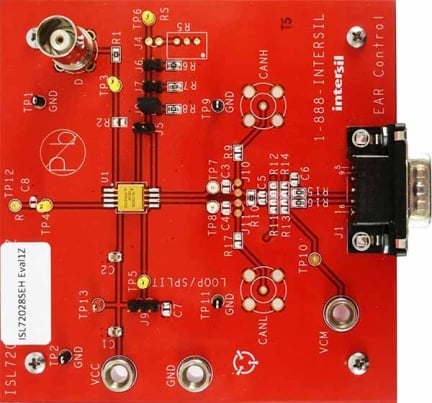Overview
Description
The ISL72026SEHEVAL1Z evaluation board is designed to provide a quick and easy method for evaluating the ISL72026SEH 3.3V, radiation tolerant, controller area network (CAN) transceiver. To use this evaluation board properly requires a thorough knowledge of the operation of the IC. Refer to the ISL72026SEH datasheet for an understanding of the functions and features of this device.
The Renesas ISL7202xSEH family of devices are 3.3V radiation tolerant CAN transceivers that are compatible with the ISO 11898-2 standard for use in CAN serial communication systems. The transceiver performs transmit and receive functions between the CAN controller and the CAN differential bus. It can transmit and receive at bus speeds of up to 1Mbps. They were specifically designed to operate in harsh environments such as space.
Features
- D-SUB 9-pin male connector for connection to another CAN evaluation board
- 60Ω resistor across the differential signal lines to evaluate propagation delay, rise/fall time and skew parameters
- Convenient test points and connections for test equipment
- Jumpers to select between the three rise/fall settings or tie RS high to enter low power listen (ISL72026, ISL72027)/shutdown (ISL72028) modes
- Banana jacks for power, ground and voltage common-mode (VCM) connections
Applications
- Satellites and aerospace communications
- Telemetry data processing
- High-end industrial environments
- Harsh environments
Documentation
|
|
|
|
|---|---|---|
| Type | Title | Date |
| Manual - Development Tools | PDF 778 KB | |
| Other | ||
| Datasheet | PDF 983 KB | |
| Report | PDF 600 KB | |
4 items
|
||
Design & Development
Product Options
Applied Filters:
Videos & Training
Introducing Renesas' first radiation tolerant 3.3V controller area network (CAN) transceivers that are fully QML-V qualified and compliant with the ISO11898-2 physical layer standard. Find out the benefits of using the full CAN bus protocol over previously used interface protocols.
The radiation tolerant 3.3V CAN Bus transceiver includes the ISL72026SEH, ISL72027SEH, and ISL72028SEH.
Transcript
Hello, my name is Josh Broline, the Mil and Aero Marketing Manager for Intersil Corporation. I am excited to introduce to you Intersil's first radiation tolerant 3.3V CAN Bus transceiver family, ISL72026SEH, ISL72027SEH, and the ISL72028SEH.
There have been a few mainstay communication protocols that have been used for years in typical satellite designs such as RS-422 and MIL-STD-1553. These have been very robust and reliable communication protocols for some time, so they were used over and over again.
However, these protocols have their limitations. RS-422 and MIL-STD-1553 have a limit on how many nodes can be on one Bus, do not have the same ease of use when it comes to data prioritization, it can consume much more power. The RS-422 and MIL-STD-155 protocols are often used in point-to-point communication designs, which greatly increase the amount of cables that are required versus CAN Bus protocol. With the introduction of a true CAN Bus transceiver, the total solution will be complete.
System engineers are excited to start flying a true CAN Bus transceiver for several reasons. Just to name a few, using the Intersil CAN Bus transceiver, power consumption will be reduced, the solution footprint will be reduced, true cold spare capability for redundant applications will be possible, and a radiation single event effects tolerant solution will be available.
The Intersil devices are compatible to the ISO11898-2 specification, in our guaranteed wafer-by-wafer to 75krad with a low dose ray exposure of 10mrad/s. Up to 120 nodes or transceivers can be connected to a single CAN Bus to reduce cabling, weight, power cost, also known as swap.
The devices operate off of a 3.3V bias voltage, but have a bus fault protection up to ±18V, even under a heavy ion environment, but particle energies up to 60MeV. Also, the transceivers can operate up to speeds of 1MB/s, which is in line with the ISO standard.
We offer three different products in this family. The ISL72026SEH has a loop back feature which provides a node diagnostic mode. The ISL72027SEH offers a split mode feature which helps improve EMI and EMC. The ISL72028SEH has a low power shutdown mode. We offer a complete set up supporting tool such as evaluation boards, data sheets, SEE, radiation report, SPICE, and IBIS models.
Thank you for watching.


